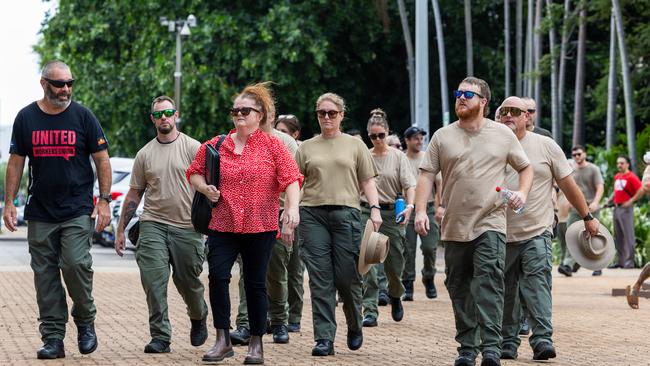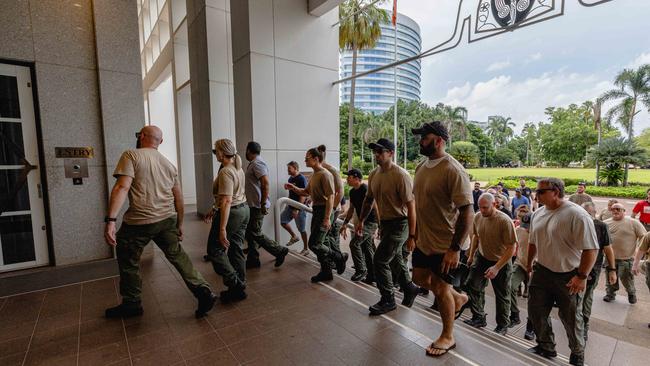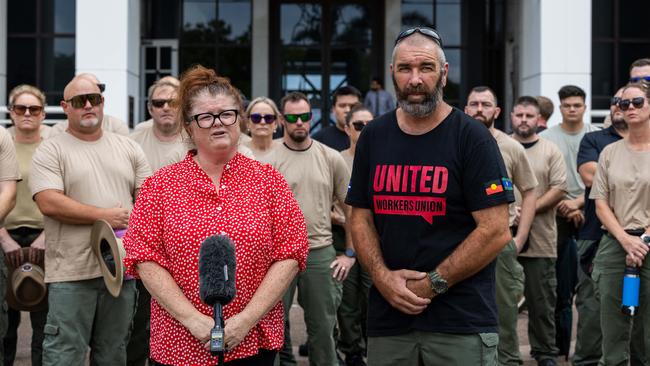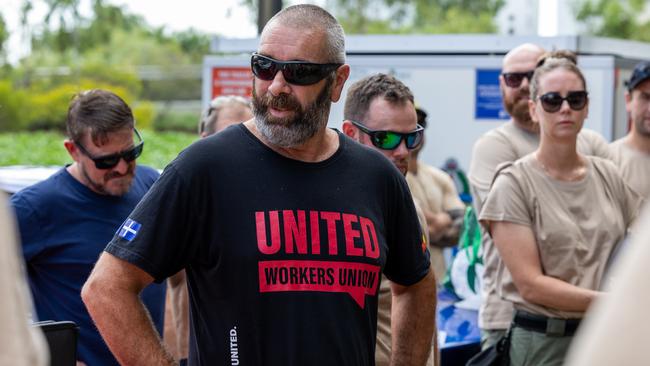United Workers Union announces upcoming ‘no confidence’ vote on Corrections Commissioner Varley
Prison workers have called for a vote of no confidence in the Territory’s Corrections Commissioner Matthew Varley as a controversial emergency prison ‘privatisation’ bill is set to be pushed through parliament.

News
Don't miss out on the headlines from News. Followed categories will be added to My News.
Prison workers have called for a vote of no confidence in the Territory’s Corrections Commissioner Matthew Varley as a controversial emergency prison ‘privatisation’ bill is set to be pushed through parliament.
The Correctional Services Legislative Amendment Bill 2025 was tabled on urgency in NT Parliament this week, and is expected to go to a vote on Thursday.
The bill has angered prison workers, with more than 40 Corrections officers staging a silent protest by filling the Parliamentary gallery on Tuesday afternoon.
United Workers Union NT secretary Erina Early stood alongside a crowd of Corrections officers outside of the Territory parliament in opposition to legislation she said would “start privatising the prison”.
The Correctional Services Legislative Amendment Bill 2025 will give the Commissioner the power to employ private contractors in Territory prisons.

In the explanatory statement, Mr Maley said it would create “a more flexible workforce and implement staffing surges when required”.
The bill allows the Commissioner to “appoint a person to be a special correctional officer … if satisfied the person has the qualifications, skills or experience to properly perform the(ir) functions”.
It will allow interstate or private personnel to take up Corrections shifts, and gives them the same “powers” given to the formally trained NT Corrections staff.

Corrections Minister Gerard Maley has previously said the move would allow private security workers to be called on for roles including court appearances, prison transfers, and hospital bedsits.
Mr Maley said these duties cost Territory taxpayers more than $11m in overtime each year.
Under the Correctional enterprise agreement these shifts carry significant overtime bonuses to Correction staff, with Ms Early saying the privatisation push was not about overtime or alleviating fatigue, but “cutting costs”.
Ms Early said hospital and court shifts and transfers were not ‘lower skilled’ tasks, saying Territorians expected trained professionals in these “crucial roles” to maintain security both ‘inside and outside the wire’.

Corrections Commissioner Matthew Varley wrote to staff in an attempt to quell concerns about the Correctional Services Legislative Amendment Bill 2025.
Mr Varley told staff their jobs were safe.
“No one is losing their job at Department of Corrections,” he wrote.
Despite the assurances from Mr Varley, Ms Early said there had been unanimous calls from Alice Springs and Darwin members for the union to hold a “vote of no confidence”.

Ms Early said the problems in the prison were not simply staffing, stating: “The crisis is the beds”.
“We don’t have enough places to put the prisoners,” Ms Early said.
On Tuesday NT Corrections confirmed there were 2673 people in Territory cells, meaning more than 1 per cent of the entire population were locked up.
Of those there were six prisoners held in Corrections custody while at Royal Darwin Hospital and Alice Springs Hospital — meaning a total of 12 Correctional staff were required to oversee their care.
On Tuesday, Opposition leader Selena Uibo said the changes by the CLP government over the past six months had made life inside the prison “more dangerous and demanding” for workers.
“We know there is a real fear, not just from police, not just from correction staff, but also from our legal services, that someone will die in one of the watch houses,’ Ms Uibo said.
“We know there’s a real fear that one of our correction staff will be injured or worse on the job, because they are at breaking point.”





